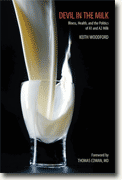Devil in the Milk
Keith Woodford
book reviews:
· general fiction
· chick lit/romance
· sci-fi/fantasy
· graphic novels
· nonfiction
· audio books
· author interviews
· children's books @
curledupkids.com
· DVD reviews @
curledupdvd.com
newsletter
win books
buy online
links
home
for authors
& publishers
for reviewers

 |
Devil in the Milk: Illness, Health and the Politics of A1 and A2 Milk Keith Woodford Chelsea Green Publishing Paperback 240 pages March 2009 |
|
Devil in the Milk
The tempest is rooted in two powerful winds: the first is greed, the second is the innately stubborn human mind. It takes about ten years to change a dairy from using A1 milk – the common form of milk in much of the West – to A2 milk cows. That requires a lot of money – and convincing. Thus greed leads to more trouble of the ethical kind. Author Keith Woodford, Professor of Farm Management and Agribusiness at Lincoln University in New Zealand, knows the ins and out of milk. He knows what milk producers want milk consumers not to know. He knows what milk producers themselves don’t want to know. This where the righteous indignation comes in and where complications, semantics, and concentration ensue. The book is rife with semantics and scientific gamesmanship. By the second chapter, "Milk and Casomorphins," the reader realizes that words used in studies have scientific meaning, are subtle, and are often subtly used by scientists who are willfully or innocently hiding the result of a particular study. Words such as “confounding,” “significance,” “prevalence,” and “incidence” are just a few. By the time one has read through Chapters 4 and 5 and seen how scientists have distorted the meaning of milk studies related to diabetes and heart disease, the word “milk” will have taken on a whole new meaning. No longer will one be able to hear statistics about “milk” or milk-related disease without asking about the study’s definition of milk and a whole host of other questions. Highly recommended, this book is academic yet conversational and gossipy at the same time. It’s subjective writing on objective facts. It’s timely and definitely connected to contemporary issues such as health care, pharmaceutical dishonesty, and the guiling and beguiling use of media sound bytes. For academic reading, Devil in the Milk Originally published on Curled Up With A Good Book at www.curledup.com. © Carole McDonnell, 2009 |
|
|
|
 Click here to learn more about this month's sponsor! |
|
| fiction · sf/f · comic books · nonfiction · audio newsletter · free book contest · buy books online review index · links · · authors & publishers reviewers |
|
| site by ELBO Computing Resources, Inc. | |
 Woodford begins by telling us
that there are basically two different kinds of milk. The differences stem from a mutated chemical string that has been found in certain cows. It’s a situation where human breeding has created a kind of survival of the fittest where the cows with the mutated gene dominates the
West because the opiod factor in the milk gene tends to make the cows more placid. These cows produce A1 milk, which is implicated
in autism, schizophrenia, heart disease and diabetes. (Of course, this is before
pasteurization, bovine growth hormones and other industry practices add their
own damage.) Then there is the safer milk from unmutated cows; one – A2 milk– is primarily safe. Unfortunately, farmers – and milk production companies – in the
West have been using mutated cows for ages. Change is difficult when greed is involved. Talk about a tempest in a teapot.
Who knew there was this battle going on between producers of A1 milk and A2 milk?
Woodford begins by telling us
that there are basically two different kinds of milk. The differences stem from a mutated chemical string that has been found in certain cows. It’s a situation where human breeding has created a kind of survival of the fittest where the cows with the mutated gene dominates the
West because the opiod factor in the milk gene tends to make the cows more placid. These cows produce A1 milk, which is implicated
in autism, schizophrenia, heart disease and diabetes. (Of course, this is before
pasteurization, bovine growth hormones and other industry practices add their
own damage.) Then there is the safer milk from unmutated cows; one – A2 milk– is primarily safe. Unfortunately, farmers – and milk production companies – in the
West have been using mutated cows for ages. Change is difficult when greed is involved. Talk about a tempest in a teapot.
Who knew there was this battle going on between producers of A1 milk and A2 milk?